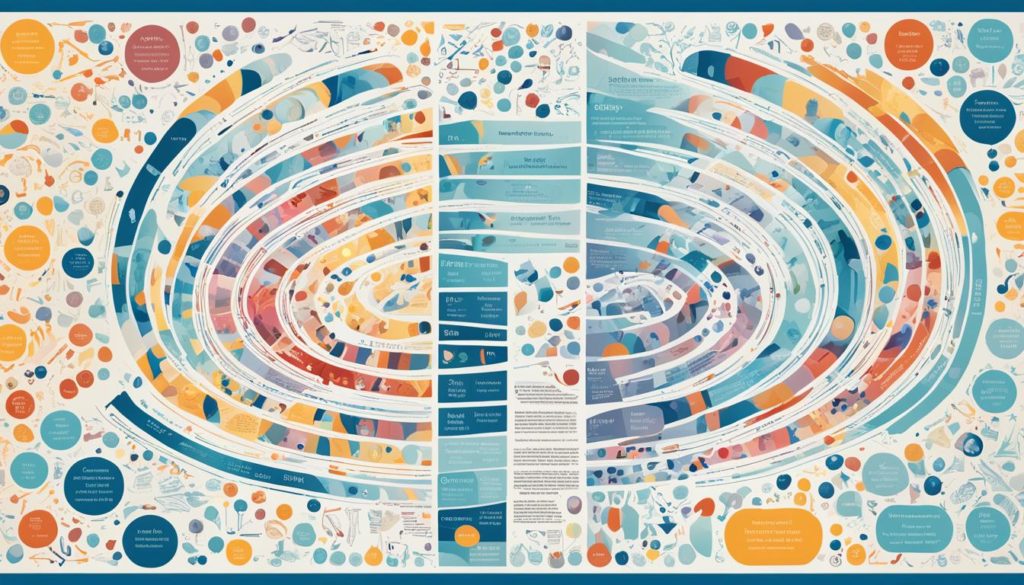Did you know one in seven men will face prostate cancer? This disease is the second most common cancer among men worldwide. Dr. Humphreys from Mayo Clinic states that it starts with cell mutations in the prostate. This leads to the growth of malignant tumors. It’s hard to spot without regular screenings because it often shows no symptoms early on. Catching it early can make treatment much more effective.
Age is a big risk factor, especially for older men. African American men also have a higher chance of getting it. Other factors include family history, being overweight, and certain foods. Knowing these can help lower your risk of prostate cancer.
Key Takeaways
- Prostate cancer affects one in seven men and is the second most common cancer among men worldwide.
- Regular screenings are crucial for early detection and significantly improve treatment outcomes.
- Key risk factors for prostate cancer include age, family history, obesity, and ethnic background.
- Preventive measures include maintaining a healthy diet and engaging in regular exercise.
- Treatment options vary based on the cancer’s stage and growth rate and may include surgery, radiation, chemotherapy, and hormonal therapy.
Introduction to Prostate Cancer
Prostate cancer affects the male reproductive system. It varies across age groups, races, and ethnicities. Knowing the importance of regular Prostate Cancer Screening is vital, especially since early stages might not show symptoms.

Common signs of Prostate Cancer Symptoms include trouble urinating and blood in urine or semen. Other symptoms are bone pain, weight loss without trying, and fevers. These usually indicate the disease has advanced, stressing the need for early detection.
Doctors diagnose prostate cancer through several steps. They start with digital rectal exams (DRE) and blood tests for prostate-specific antigen (PSA). The Gleason score helps know how fast the cancer grows. Bone scans, CT scans, MRIs, and PET scans can tell if the disease has spread.
Different treatments are chosen based on the cancer stage and patient needs. Options include:
- Active Surveillance
- Radical Prostatectomy
- Radiation Therapy
- Chemotherapy
- Hormone Therapy
- Combination Treatments
Understanding Prostate Cancer Genetics is key. Genetics can raise someone’s risk for the disease. This shows why treatments should be personalized.
Prostate Cancer Screening is key for catching the disease early. It leads to more successful treatments and better life quality.
Genetic Factors in Prostate Cancer
Research focuses on how family history and gene changes increase the risk of prostate cancer. Knowing about these genetic factors helps find those at higher risk. It also helps doctors come up with treatment that suits each person.
Role of Family History
Having family members with prostate cancer greatly raises your risk. If a brother or a young family member had it, the risk is even higher. This shows how important it is to keep an eye on health and maybe start checking early.
Inherited Gene Mutations
Genes like BRCA1 and BRCA2 can change and make prostate cancer more likely. BRCA2 changes are especially risky. Lynch Syndrome also increases the chance of getting this cancer.
Even though these gene changes don’t cause most prostate cancer cases, they greatly affect those who have them. This is why gene tests and advice from doctors are crucial.

Age as a Risk Factor
Older men face a higher risk of prostate cancer, with age being a key factor. The chance of getting prostate cancer goes up after 50. About 60% of cases are in men over 65, showing the link between age and this disease.
Men younger than 40 rarely get prostate cancer. This highlights the strong connection between the disease and older age. Doctors suggest regular screening for those at risk due to their age. Screening for prostate cancer after 50 can catch it early, leading to better outcomes.
In conclusion, the relationship between age and prostate cancer stresses the need for awareness among older men. As risk grows with age, screenings become crucial. They help in keeping up with one’s health and staying ahead of possible issues.
Racial and Ethnic Influences
The racial and ethnic background plays a significant role in prostate cancer risk. This disparity is particularly notable in different demographic groups.
Higher Risk in African American Men
African American and Caribbean men face a higher rate of prostate cancer. They often get the disease at younger ages. The cancer is also more aggressive compared to other races.
Comparative Studies Across Ethnic Groups
Asian American, Hispanic, and Latino men have a lower rate of prostate cancer than non-Hispanic White men. Many studies try to find out why prostate cancer rates vary among racial and ethnic groups. Yet, the reasons behind these differences are not fully known. More research is needed to better understand prostate cancer’s spread.
| Ethnic Group | Prostate Cancer Risk |
|---|---|
| African American and Caribbean Men | Higher risk, younger age of onset |
| Non-Hispanic White Men | Moderate risk |
| Asian American Men | Lower risk |
| Hispanic and Latino Men | Lower risk |
Obesity and Prostate Cancer Correlation
Obesity is closely linked with prostate cancer risk. But, the link is complex. Research shows obesity might not always increase the risk of prostate cancer. Yet, it plays a big role in how the disease grows. For instance, obese men are less likely to get low-grade cancer but more likely to get aggressive types.
Obesity’s link to aggressive prostate cancer highlights the need to understand these connections. Various studies suggest that obesity affects cancer outcomes and recurrence rates. It’s important to study these effects.
Additionally, the way obesity connects to Metastatic Prostate Cancer is key. It makes us look at lifestyle choices like diet and hormone levels. Because obesity can lead to hormone imbalances, catching the disease early and making lifestyle changes is critical.
When we think about obesity’s impact on prostate cancer, we see it creates a higher risk for those overweight. The complex relationship between obesity and metastatic prostate cancer presents challenges. Yet, it also offers chances for improved treatments and prevention methods.
Impact of Diet on Prostate Cancer
Understanding how diet affects prostate cancer is key for prevention. Many dietary factors are being studied for their impact. This includes dairy and calcium.
Consumption of Dairy Products
Some research suggests high dairy intake might increase cancer risk. Scientists think hormones in dairy or insulin-like growth factor may be reasons.
Calcium Intake
Calcium’s effect on prostate cancer is also researched. It’s crucial for bones, but its cancer link is explored. High calcium intake might raise cancer risk. Yet, normal calcium levels are safe and beneficial for bones and metabolism.
| Dietary Factor | Prostate Cancer Risk | Comments |
|---|---|---|
| Dairy Products | Possible Increase | Potentially linked through hormones or IGF |
| Calcium Intake | Controversial | Standard intake deemed safe; high levels under investigation |
These findings show diet’s importance but more research is needed. It’s wise to eat balanced and be aware of these factors for good health.
Lifestyle Factors Prostate Cancer
Lifestyle factors play a big role in fighting prostate cancer. Being active is key to prevention. Having regular Exercise Prostate Cancer workouts helps keep you healthy and lowers your cancer risk.
Eating right is also important. A diet full of fruits, veggies, and lean meats keeps you at a good weight. This lowers your chance of getting a bad type of prostate cancer. But, eating too much saturated fats and red meats can up your risk.
| Lifestyle Intervention | Impact on Prostate Cancer Prevention |
|---|---|
| Regular Exercise | Reduces risk by improving overall health and managing weight. |
| Healthy Diet | Lowers risk by emphasizing nutrients that support prostate health. |
| Weight Management | Crucial in reducing the risk of aggressive prostate cancer types. |
Scientists are still figuring out how lifestyle affects prostate cancer. But it’s clear that healthy choices play a big part in lowering the risk of the disease.
Hormonal Influences on Prostate Cancer
Hormones play a big role in the growth of prostate cancer. It’s important to understand this for better treatments and managing risks.
Role of Testosterone
Testosterone is crucial for prostate cancer cells to grow. When there’s a lot of testosterone, these cells multiply faster. This is why reducing testosterone levels through therapy can help slow tumor growth and make treatments more effective.
Impact of IGF-1
IGF-1 is another hormone connected to prostate cancer. High IGF-1 levels can increase cancer risk. Like testosterone, IGF-1 helps cancer cells grow and survive. Watching and managing its levels is important for catching the disease early and finding the right treatment.
So, hormones like Testosterone and IGF-1 are big factors in prostate cancer. Continued research is vital. It helps find the best ways to lessen their impact and improve patient care.
FAQ
What are the primary causes of prostate cancer?
Prostate cancer begins when cells in the prostate change and grow uncontrollably. Age, family history, and obesity can increase risk.
How is prostate cancer diagnosed?
Doctors start with a digital rectal exam and a PSA blood test. They might also use scans like MRIs to check the spread.
What are the treatment options for prostate cancer?
Treatment depends on the cancer’s stage and growth rate. Options include surgery, radiation, chemotherapy, and blocking testosterone.
What are the genetic factors involved in prostate cancer?
A family history of the disease is a major risk factor. Changes in BRCA1 or BRCA2 genes also raise the risk.
What are the symptoms of prostate cancer?
In its early stages, prostate cancer might not cause symptoms. Later, it can lead to problems urinating, blood issues, and bone pain.
How frequently should men be screened for prostate cancer?
Men, especially over 50 or with high risk factors, should get screened often. Early detection makes treatment more effective.
How does age influence the risk of prostate cancer?
After 50, the risk of prostate cancer increases significantly. Most cases are found in men older than 65.
Are African American men at higher risk for prostate cancer?
Yes, African American and Caribbean men of African ancestry face a higher risk and earlier onset.
How does obesity relate to prostate cancer?
Obesity may raise the risk of aggressive prostate cancer, but it could lower the risk of less severe types.
Can diet affect the risk of prostate cancer?
Dairy and calcium might slightly increase prostate cancer risk. Still, a healthy diet is advised.
What lifestyle factors influence prostate cancer risk?
Eating well and exercising regularly can lower the risk. They also boost overall health.
What role do hormones play in the development of prostate cancer?
Prostate cancer cells grow faster with more testosterone. High IGF-1 levels also increase risk. Hormonal treatments often aim to reduce testosterone.


